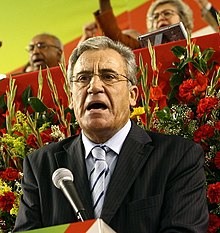Jerónimo de Sousa
Jerónimo Carvalho de Sousa (born April 13, 1947 in Santa Iria de Azóia , Loures ) is a Portuguese politician . Since November 2004 he has been General Secretary of the Communist Party of Portugal (PCP). He is a member of the Portuguese Parliament ( Assembleia da República ) and was also a candidate for the Portuguese presidential elections in 1996 and 2006 .
Life
Until 1974
Jerónimo de Sousa was in a poor working class family at the time of Salazar - regime born. He finished his school education up to the age of 14 and moved - as was customary at the time - to the MEC steel foundry near Lisbon. A little later he began to be interested in anti-fascist organizations in Portugal and then also took part in events of the then banned Communist Party of Portugal ( Partido Comunista Português ). As one of the few who could read, he read his colleagues' articles from the forbidden and clandestinely distributed Avante! in front.
From 1969 to 1971 Jerónimo de Sousa took part in the Portuguese colonial war, which broke out after the independence efforts of the Portuguese colonies in Africa. He served in Guinea-Bissau , where he had to fight against the Marxist freedom movement Partido Africano da Independência da Guiné e Cabo Verde .
After Salazar resigned from his post as “leader of the nation” in 1969 and was replaced by Marcelo Caetano , there were slight openings on the part of the regime. Workers who were not known for their work critical of the regime could be elected to unions. In 1973 he took part in the elections for the chairmanship of the Lisbon Metalworkers Union and unexpectedly won them with his communist-influenced electoral list. From April 1974 to 1995 the MEC was also represented in the works council.
After 1974
Immediately after the Carnation Revolution and after the various parties had re-established themselves, de Sousa applied for membership in the Partido Comunista Português and became politically active. He ran in the first democratic elections in 1975, which were to form a first constituent assembly of MPs. After winning a mandate, it aroused multiple amazement that a worker had moved into the Portuguese parliament. Jerónimo de Sousa also took part in the following parliamentary elections and was re-elected each time. Only from 1993 to 2002 he was not represented in the Assembleia da República .
In the meantime he became increasingly involved in the Partido Comunista Português (PCP), in 1979 he was elected to the Central Committee of the PCP for the first time, and in 1992 he became a member of the Politburo. In 2004 he succeeded Carlos Carvalhas as general secretary of the party, and since then he has been the leading figure of the Portuguese communists.
De Sousa also ran twice for the Portuguese presidential elections. In 1996, however, he gave up to support the socialist candidate Jorge Sampaio . In the presidential elections in 2006 he reached fourth place with 8.64 percent behind Aníbal Cavaco Silva (50.54 percent), Manuel Alegre (20.74 percent) and Mário Soares (14.31 percent). However, he was the only candidate to win a voting district against the winner Cavaco Silva, the traditionally communist district of Beja . Only his own party, the PCP, and the Portuguese Greens , who are very close to the communists in Portugal, supported him .
Web links
- Short biography of Jerónimo de Sousa at the Assembleia da República (Portuguese)
| personal data | |
|---|---|
| SURNAME | Sousa, Jerónimo de |
| ALTERNATIVE NAMES | Sousa, Jerónimo Carvalho de |
| BRIEF DESCRIPTION | Portuguese politician |
| DATE OF BIRTH | April 13, 1947 |
| PLACE OF BIRTH | Santa Iria de Azóia , Loures Portugal |
